Throwback Thursdays – Art Ross
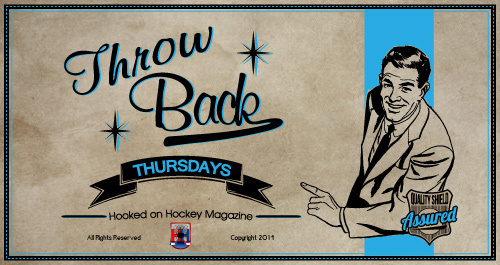
After the last week’s conclusion to a three part look back on Jack Adams amazing careers as a player, coach, and manager, I thought it would be appropriate to look back at the life of Art Ross. Ross was yet another notable NHL player who would be inducted as such, while leading an equally (or possibly more impressive) life as an executive in the game.
Who was Art Ross?
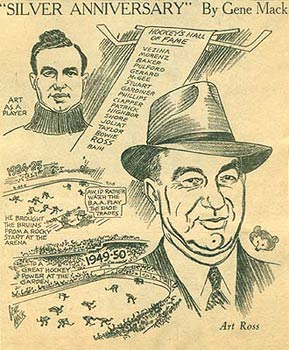
Arthur Howey ‘Art’ Ross was born on January 13, 1886 in Naughton, Ontario. Naughton was a community in Walden, which has since become part Greater Sudbury. Ross was born in a time where protection wasn’t a thing, as he was the twelfth of THIRTEEN children. I have one child and he’s a handful, I can’t imagine thirteen.
Anyways, as a young boy the Ross family moved to Westmount, an english-speaking suburb of Montreal. He started playing organized hockey in Westmount, where he eventually found himself on the Westmount High School team with the famed Patrick brothers, Lester and Frank – also future Hall of Famers.
Ross made a name as a defenceman for his rushing style of play, a style of play the Bobby Orr would later make famous. In his first season in the top amateur league in Canada at the time, the Canadian Amateur Hockey League (CAHL), Ross scored 10 goals in eight games. This was unheard of for a defenceman to score that much in the early 1900s.
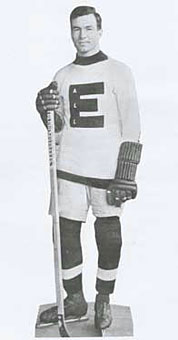
In 1905-06, Ross moved to Brandon, Manitoba to accepting a job within the banking industry. While there, Ross would join the amateur Brandon Wheat Cities team, and score five goals in eight games, before being promoted to Brandon’s professional team in the Manitoba Hockey League the following season, scoring a further five goals in nine games.
Upon the completion of the 1906-07 season, the Kenora Thistles finished atop of the MHL and had a chance at a Stanley Cup. They were allowed to add players to their roster for their cup challenge and Ross’s solid season earned him the call up. This was a good decision on Kenora’s part, as Ross helped to win their challenge against the Montreal Wanderers, thus becoming Cup champions.
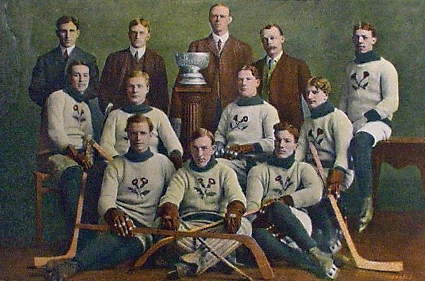
In an example of just how important Ross was to the Thistles, the Wanderers challenged Kenora a few months later and the Thistles lost without Ross.
An opportunity presented itself after the Cup win, when the Wanderers requested Ross join them in Montreal. He gladly accepted, and helped lead them to a first-place finish in the Eastern Canada Amateur Hockey Association (ECAHA). He also led all defenders in goals, with eight in 10 games. The Wanderers would also fend off challenges from Winnipeg, Toronto, and Ottawa to retain the Stanley Cup they had previously won back from Kenora earlier in the year. Thus, in 1907, as the Hall of Fame tells us “Art Ross became just the second player to win the Stanley Cup with different teams in consecutive years, following Jack Marshall, who won with the Winnipeg Victorias in 1901 and with the Montreal Hockey Club in 1902.”
After a few more seasons with the Wanderers, Ross joined the All-Montreal Hockey Club of the newly formed Canadian Hockey Association in 1909-10, scoring four goals in as many games before the league folded. From here Ross would join the Haileybury Comets of another new league, the National Hockey Association (NHA). The Comets paid Ross an extraordinary sum (for the hockey world at that time) of $2,700 per season for the 1910 season.
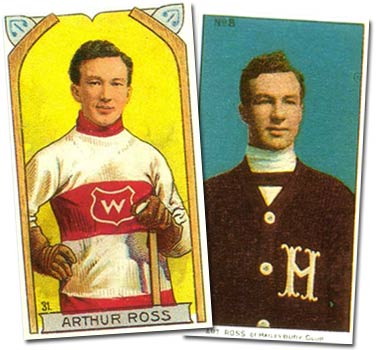
However, before the 1911 season the NHA imposed a $5,000 salary cap and Ross realized a pay decrease was on the horizon, so he left Haileybury to rejoin the Wanderers, who by this time had gained admittance to the NHA.
After his fourth season in the league, Ross asked for a pay increase, but was sternly refused by the Wanderers. After talking to some other players from the Wanderers and other NHA clubs, Ross decided to start his own league without a salary cap. As he wrote to the Montreal Herald:
“All the players want is a fair deal … The players are not trying to bulldoze the NHA, but we want to know where we get off at.”
Ross was suspended from the team for his actions, but decided to declare himself a free agent instead of accept the punishment. However, his league never found a footing as all of the arenas he planned to use for his new league were rented by the NHA. Without even a whimper, or a name, his league faded and never saw its first game.
The NHA, realizing if they suspended all of the players who sought to join the league would not have enough stars left in their league, decided against suspending Ross again. The Wanderers still decided to release him after the incident as he had embarrassed the team and league with his actions.
Ross would sign with the Ottawa Senators before the 1914-15 season, where he would take the team into a tie for first place with the Wanderers. This resulted in a two game series that Ottawa won 4-1, meaning they won the right to challenge the Vancouver Millionaires of the Pacific Coast Hockey Association for the Cup. Unfortunately for Ross, the Millionaires prevailed in the showdown.
Ross played one more season in Ottawa before deciding to return to Montreal yet again, this time joining the Wanders so he could be close to the sporting goods store he opened in the offseason. The Wanderers and Ross played one final season in the NHA, before Montreal, Quebec, Ottawa, and Toronto dissolved the league after a dispute with Toronto Blueshirts owner Eddie Livingstone. The same teams formed the league we now all know and love, the National Hockey League, in the 1917.
Ross would sign on for one more season during the NHL’s inaugural year, but unfortunately a fire in the Montreal Arena on January 2, 1918, would result in the disbanding of the Wanderers after only four games. With that, Ross retired from his playing career.

To finish his playing story of, the Hockey Hall of Fame would say in an article:
“the pioneering defenceman scored 102 goals and had 34 assists in 192 through several leagues that could be deemed comparable to the best in the world at that time. He added one goal in 3 NHL games.”
Stay tuned for next week’s installment and find out more about Art Ross!



